A compelling title is the first and sometimes only hook you have to capture readers’ attention.






Book covers and titles are so critical to the success of a book that publishing houses dedicate entire teams to choosing the perfect title. Millions of books are published every year, making it extremely difficult to cut through the noise.
If you’re self-publishing your book, the weight of choosing the best title falls to you. Not only is that hard to do, but many writers are too close to their material or their working title to really consider the tastes of their target audience.
That’s why it’s crucial to test book titles with your target audience before you launch your baby out into the world. Let’s take a look at the best ways to validate your title.

Whether you’re designing the cover or hiring someone to do it for you, you need to ensure that your title conveys enough information and intrigue to capture the interest of potential readers at first glance.
A great title for fiction books will engage the reader and draw them in. A non-fiction book title will also need to be compelling, but there’ll be a greater focus on explaining what the book is about and making the point of the book clear.
Reference books are an entirely different concept, and often those titles are drier and more straightforward (Calculus 101, for example).
Every element of your book cover works together to communicate this information to your readers. The font, the images, the design, the colors – everything. But, for the purpose of this article, we’re going to focus exclusively on book titles.
It may seem like an easy task to come up with a book title. It’s anything but.
A book title should:
It takes time and focus to come up with book title ideas. The first step is to identify what you think the key feature of your book or story is, and what the key themes are.
From there, you can brainstorm titles that work well with your book with friends and colleagues, or even just yourself. You should also research other books in your genre or related to your topic for inspiration.
Like any piece of content, search engine optimization (SEO) matters. Your book needs to be distinct enough that it quickly pops up in Google search results and unique enough it isn’t confused with other books.
It also needs to be compelling enough that it drives click-throughs and ultimately book sales.
Google is a good place to conduct rapid research into the other titles in your category.

If you’re having a hard time coming up with names you can use online tools or even an artificial intelligence (AI) name generator to help generate title ideas.
There are dozens of AI book title generators on the market, most of which are free. One example is Adazing.
The Adazing book title generator prompts you for key information about your book, and uses that information to generate a title.
Information it asks you for includes:
BookRaid is another AI title tool that generates titles based on a brief synopsis you type into its prompt box. First, you select a genre like young adult or then give a synopsis of your novel or short story to get an AI-generated title.
These programs can also give you tagline ideas or even chapter titles.
Looking for more inspiration for your novel or short story?
Here's how to create original content
Free tools powered by AI are a great tool for generating title ideas and concepts, but the best art needs a human touch.
So now that you’ve come up with a few potential titles for your book, it’s time to test them with unbiased respondents – in other words, not your family or friends on social media.
It’s important to validate the ideas with real people from your target demographic and target audience.
Book title testing has real-world success stories – just ask best-selling author Sean Rosensteel. Rosenteel launched his debut book after validating the title using PickFu.
He tested everything from the book description through to the title and even his author photo.
The results? The book, The School of Intentional Living: A Real-World Approach to Living Life on Your Terms became an Amazon bestseller in five categories!
It doesn’t matter what you’re writing, from fiction to nonfiction, children’s books to murder mystery – validating your new book with your target audience can help you increase sales and readership.
Using PickFu, you can create a poll testing up to eight titles and choose the audience you want feedback from, starting with a minimum of 15 U.S.-based respondents.
You can target your audience by demographics like age, gender, and income, or by other traits such as reading frequency or their preferred book genre.
Respondents vote on or rank their favorite options and give written explanations for their picks.
For the purposes of this article, we asked Adazing to generate four book titles about car mechanics in a story about racing.
After a few rounds of prompting, we had four compelling titles to choose from.
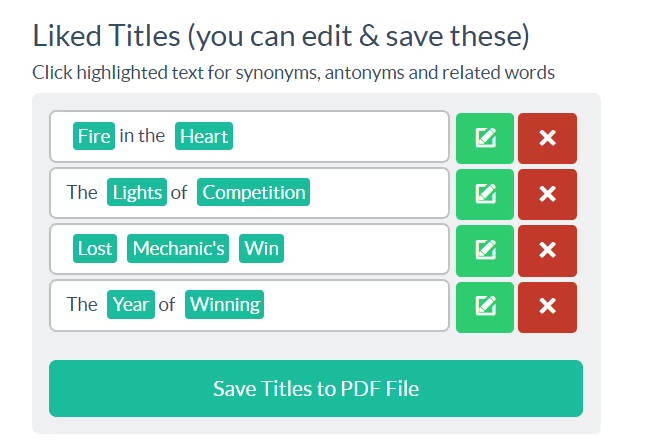
We then used the PickFu title validation template to test these potential titles, and in less than 20 minutes, we received 30 responses to our poll.

The narrow winner was Fire in the heart, but we were able to understand why that title stood out thanks to responses like this one:
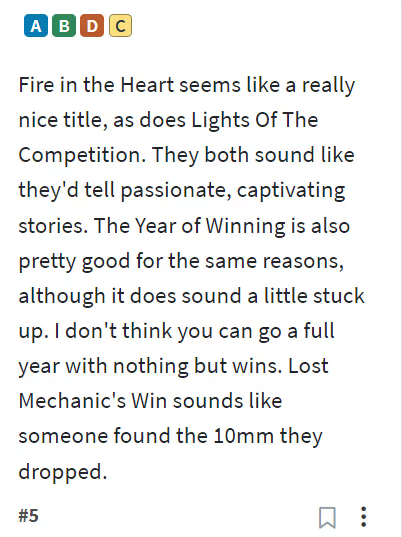
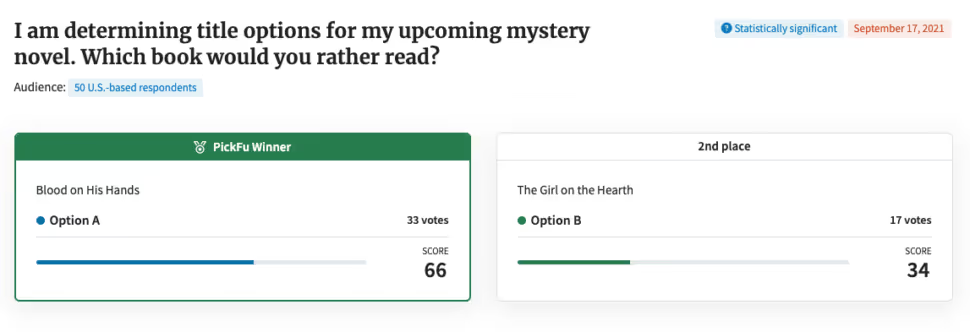
In this PickFu poll, an author tested two titles for a mystery novel with a general 50-person audience.
Option A is Blood on His Hands. Option B reads The Girl on the Hearth.
In just 29 minutes, the author had a winner: Option A, with 66% of the vote.
Respondents felt that the title, Blood on His Hands, fit the mystery novel genre best. They said things like:
Some readers found Option A too scary.
“[Option B] sounds a bit less gruesome. [Option A] sounds like a cold-blooded murder which is too scary,” wrote one respondent.
Yet, for another respondent, the gory title sealed the deal: “[Option A] sounds like there will be more action and more killing which I like in the mystery novels that I read.”
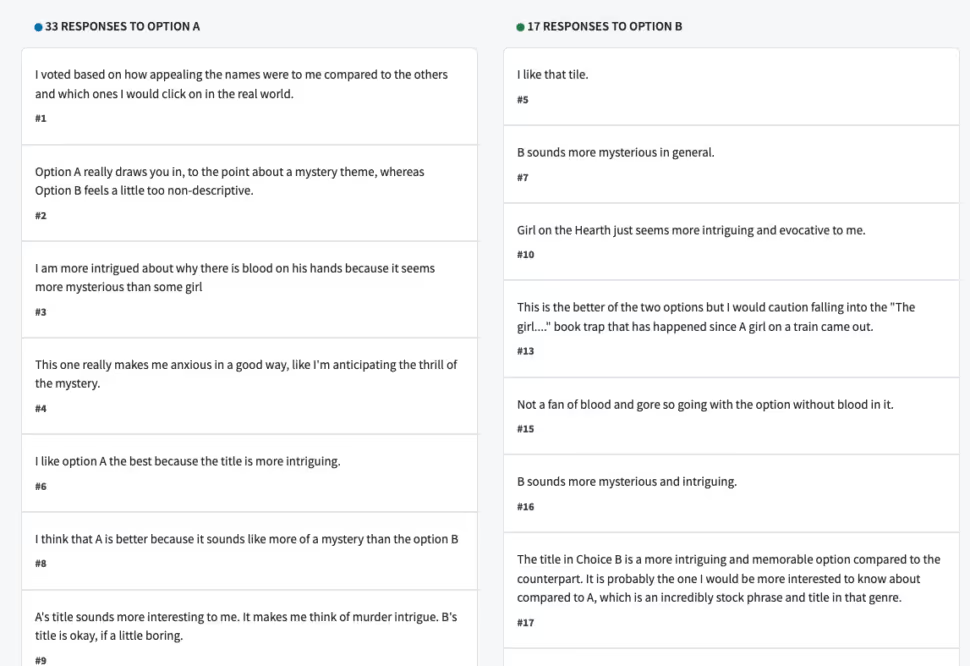
The comments in this poll give the author plenty to think about. For example, who is the intended audience – those who like blood and gore or those who want mystery more than murder?
Here’s something else to consider: one person mentioned the overuse of “The girl on the _____” titles. The Girl on the Train comes to mind.
But a quick Google search engine check shows there are already several books titled Blood on His Hands or something similar, which means it would be that much harder to find this book in search results.
Note to author: there’s still no book out there with the title The Girl on the Hearth.
Finally, you have to wonder what the results of this poll would have been had the author polled only mystery and crime readers, one of the many available audiences on PickFu.
Split-test your title options with your intended readers, and you’ll get helpful feedback that will lead you to the right title for your book.
Every new poll from PickFu gets an AI-generated summary and sentiment reports. This software picks out the key themes from your audience feedback and puts it into a fast, easy-to-understand, actionable insight that you can use to guide your decisions.
In our sample title testing poll, the AI tool helped distill 30 responses down to one clear paragraph:
Option A emerged as the winning choice in this survey, garnering a final score of 53. Respondents frequently described it as "down to earth," "relatable," and "intriguing." The title "Fire in the Heart" seemed to evoke strong imagery and curiosity, making it appear exciting and filled with adventure. This emotional appeal distinguished Option A from other titles that were perceived as either too generic or less engaging.
These AI insights are just another way PickFu offers quick and easy user testing for all sorts of products, including books.
PickFu is a fast, easy, and affordable way to test book titles with the audience you want to reach.
You can use the polling and survey platform to test book covers, titles, blurbs, author bios, and more. Respondents will vote for their favorite and share written comments so that you get the why behind their answers, not just the what.
PickFu offers a suite of templates and sample polls for publishers and self-publishers to help you perfect your book and marketing plan before you launch it. You can even target readers by age, gender, favorite genre, and much more.
The types of market surveys available for you to run are almost unlimited. When it comes time to market your book, you can use PickFu for slogan testing as well.
With these real-world insights added to your suite of writing tools, you’ll have the best possible chance of success when you publish your next book.
Sign up for free today to begin testing your book titles with PickFu. Happy writing!
The short answer here is yes. Headline testing is similar to title testing and there are free online tools that analyze headlines. However, there are so many dedicated book title testers that it might be better to use a tool like Reedsy, Adazing, or BookRaid to create title ideas. Remember, the key is to validate those titles using market research tools like PickFu.
Shorter is generally better. We recommend a length of 2-4 words for fiction or 6-10 for nonfiction, which often benefits from a subtitle. These tend to perform well in Amazon searches, and they’re easier for readers to remember.
A book title should give readers a hint of what’s to come and make them want to know more. Even better if it makes the reader start asking questions that lead them to crack open your book!
A book title should also be short, memorable, and easy to say. Finally, make sure it’s unique and therefore searchable. If it’s competing with dozens of similar titles, it’ll be harder for readers to find.
A powerful book title is one that both embodies the story you’re about to tell and sticks in the reader’s mind. Think Everything I Never Told You by Celeste Ng. Or The Devil Wears Prada by Lauren Weisberger. Or Love in the Time of Cholera by Gabriel García Márquez. Each of these titles encapsulates the story on the page and sparks all sorts of intrigue.
Amazon is dominating the self-publishing sector thanks to its Kindle self-publishing platform. The trick is standing out among the crowd. Here are some tips on how to sell books on Amazon, and others on how to sell audiobooks on Amazon.

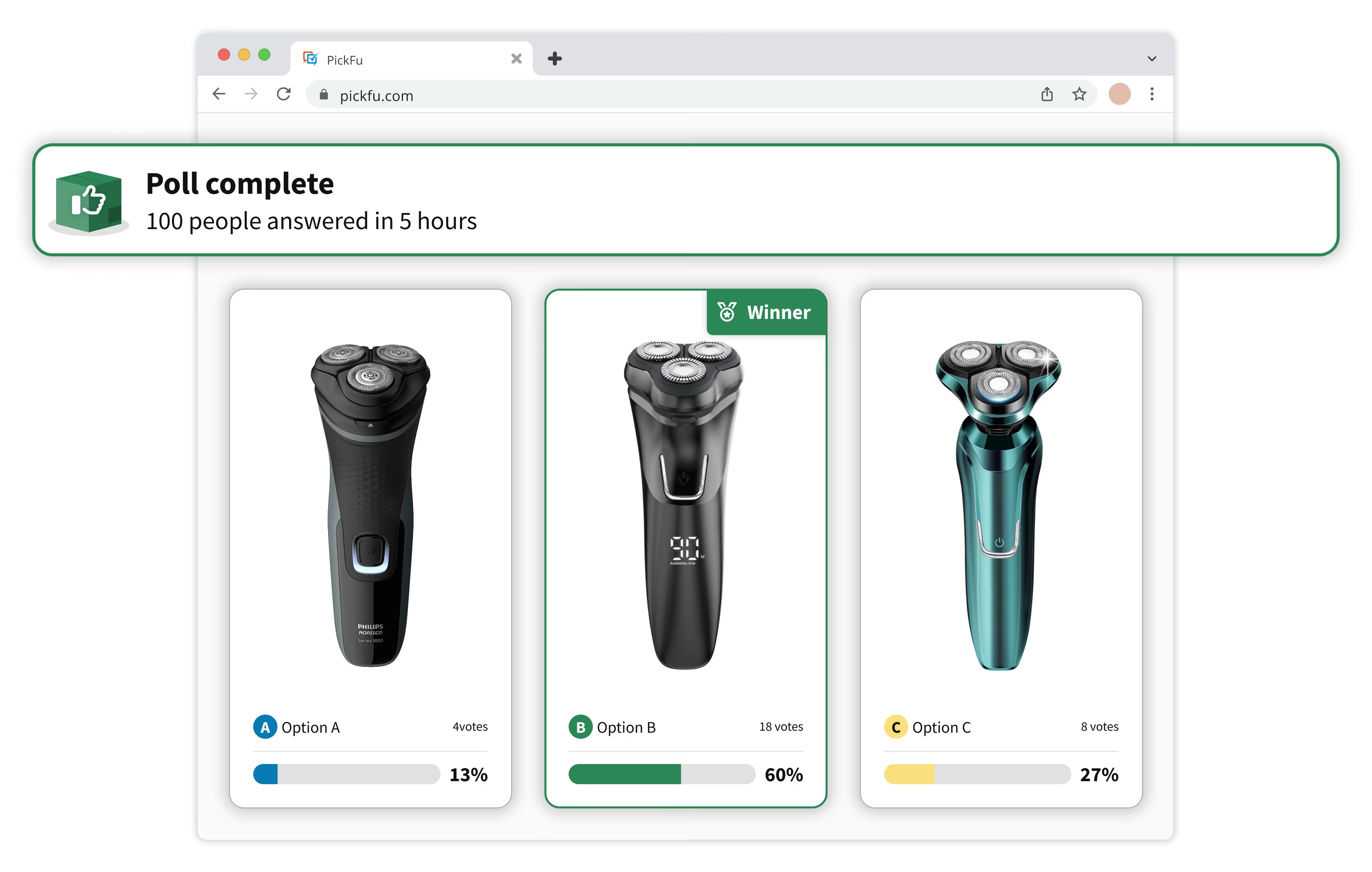
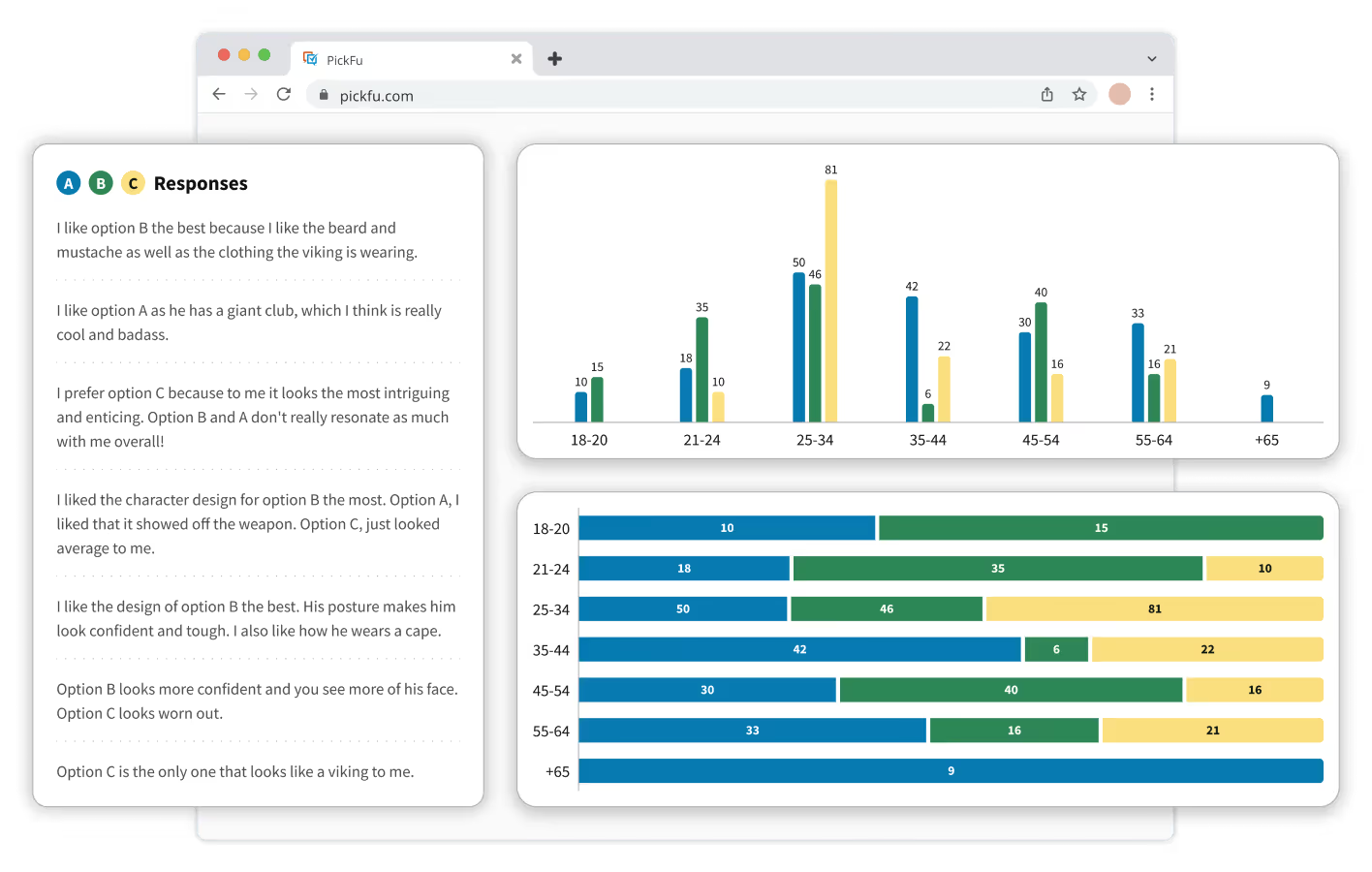
Stand out from the competition with products that customers love.
Sign up for free and launch your first poll in just a few clicks.